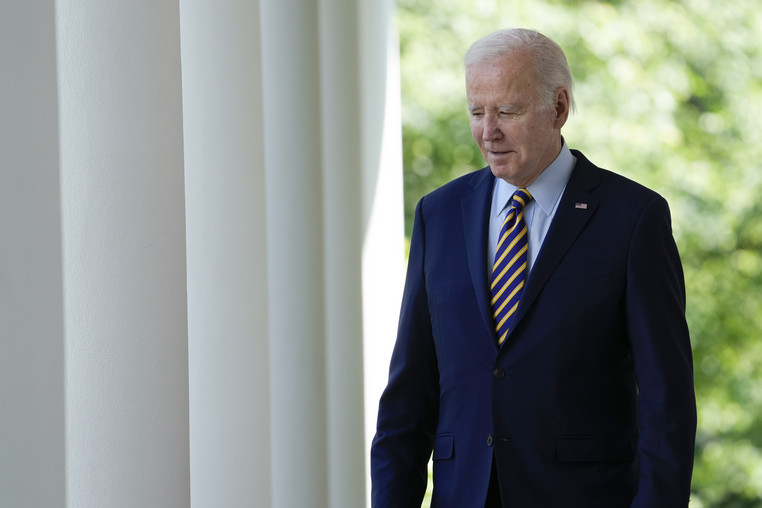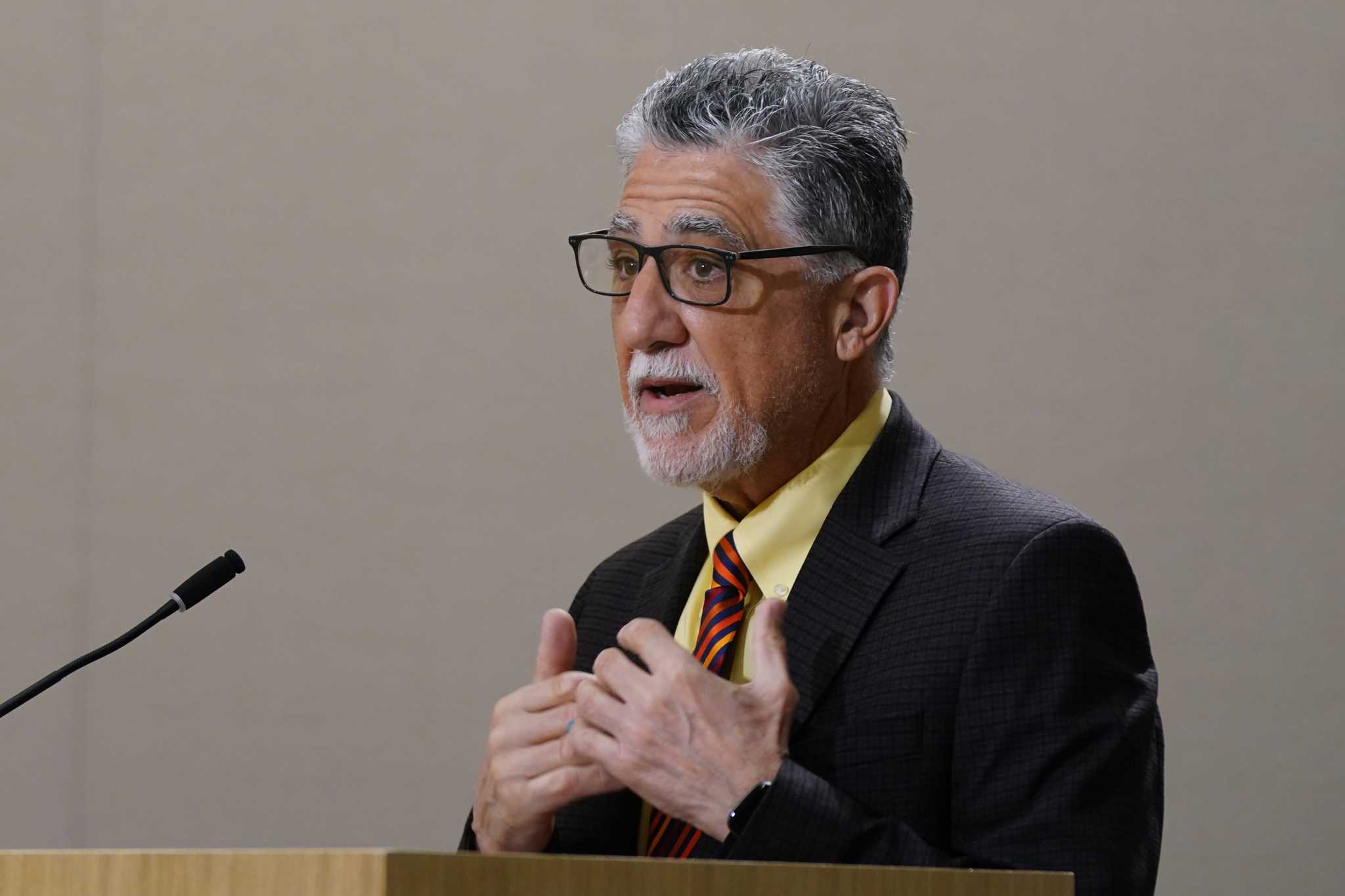With Alice Miranda Ollstein
President Joe Biden has not ruled out cutting Covid funds, which could have a negative impact on controlling the spread of STDs. | Susan Walsh/AP Photo
COVID CASH CLAWBACKS THREATEN STD FIGHT — Senior Biden administration officials and public health leaders warn that debt ceiling negotiations around clawing back unspent Covid-19 money would have an unintended consequence: increasing sexually transmitted diseases.
President Joe Biden confirmed in early May that billions in Covid funding cuts are “on the table” as the White House and congressional leaders work to avoid a potential June 1 default.
Alice reports from the annual conference of STD directors in New Orleans that states and cities count on those dollars to support their ranks of public health workers who test people for sexually transmitted infections, find and contact others who were exposed and direct people to treatment — efforts crucial to limiting the spread of STDs and outbreaks of mpox and other diseases.
“There’s no doubt” the cuts would hurt efforts to “rebuild our public health infrastructure,” Leandro Mena, director of the CDC’s Division of STD Prevention, told Alice. “If we don’t have a robust workforce ready, who’s going to be there when we have our next outbreak?”
The cuts under discussion would come at a particularly bad time in the fight against STDs, public health officials said, with record rates of infections and a workforce decimated by pandemic burnout.
WELCOME TO FRIDAY PULSE, where we’re becoming increasingly caught up in the drama of the ivory-billed woodpecker. The species was once believed to be extinct, but new evidence to the contrary is emerging — and convincing your host.
Have you seen the ivory-billed woodpecker? What about a big health scoop out in the wild? Let me know at [email protected].
TODAY ON OUR PULSE CHECK PODCAST, host Ben Leonard talks with Robert King, who reports on a Senate panel that’s investigating the frequency of Medicare coverage denials for beneficiaries and the use of artificial intelligence — and the panel is beginning by demanding records from the largest Medicare Advantage insurers: Humana, UnitedHealthcare and CVS.
A message from PhRMA:
Middlemen like PBMs are charging fees tied to the price of medicines, which means they make more money when the price of a medicine goes up. This business model allows PBM profits to soar and can lead to higher costs for patients. It’s time to lower costs for patients by holding middlemen accountable.

Sen. Bernie Sanders is left hanging on the telephone as he awaits a call from the Biden administration about drug pricing. | Alex Brandon/AP Photos
SANDERS WAITS ON A WHITE HOUSE CALL — Sen. Bernie Sanders (I-Vt.) wouldn’t commit to voting to approve the White House’s nominee to lead the NIH, your host reports.
Sanders sent a letter to the White House earlier this month saying he wouldn’t support Biden nominees who are too soft on prescription drug companies, and he told POLITICO this week that the White House hasn’t reacted to those warnings.
“I have not heard one word from the administration on this,” he said. “I’m eagerly awaiting what the administration is going to say about what they’re going to do to substantially lower the cost of a search in America — eagerly waiting, just sitting here, waiting for the call.”
At this point, Sanders said, the issue is more about the administration’s stance than Monica Bertagnolli, the director of the National Cancer Institute who’s been nominated.
“It’s not even her — I mean, this comes from the administration,” he said. “There comes a time when you’ve got to stand up and say the current system is not working. It’s nothing to do with Dr. Bertagnolli or anybody else. It is simply saying we need to change policy in this country regarding the high cost of prescription drugs.”
A White House official told Pulse in a statement that “the President shares the Senator’s concerns on drug pricing,” touting the passage of the Inflation Reduction Act and its $35 monthly cap on insulin for Medicare beneficiaries as proof of his commitment.
“We look forward to working with the Senate to get Dr. Bertagnolli confirmed,” the statement said.
A NEW MPOX RISK — A recent outbreak of mpox has federal health officials’ attention, your host reports.
In Chicago, 21 people have reported testing positive for the disease previously known as monkeypox, opening new conversations among local and federal public health officials over what measures might be needed to stop its spread.
“What’s really unique about this cluster is that most of the cases are in people who have had one or both vaccine doses,” Demetre Daskalakis, the White House’s national mpox response deputy coordinator, told reporters on a call Thursday.
Health officials said the risk of further spread is particularly high for people who aren’t vaccinated.
“Without renewed prevention efforts, especially vaccination, we are definitely at risk of a resurgence — in fact, a substantial risk of resurgence — of mpox,” Daskalakis said.
Though the vaccine strategy hasn’t changed, the administration is actively discussing what measures might be needed to prevent further spread — including how to best answer questions about the vaccine’s durability.
The outbreak comes a week after the WHO announced that mpox was no longer a public health emergency of international concern.
MORE MPOX DATA — The CDC released new mpox data Thursday that found a significant benefit from a two-shot series, POLITICO’s Carmen Paun reports.
The vaccine was on average 66 percent effective in preventing mpox in people who had received two doses, according to the study from the CDC and Epic. It was 35.8 percent effective in people who received only one.
The study authors said further research is needed to understand vaccine effectiveness based on how the shot is administered — either in the skin’s fat layer or the upper skin layer — and among people at risk of severe outcomes.
A message from PhRMA:

AGs LOOK TO WASHINGTON ON TRANQ — A group of 39 attorneys general sent a letter Thursday to congressional leaders asking for more to be done to combat the rise of xylazine, a horse sedative also known as Tranq.
The bipartisan group of state officials asked lawmakers to pass the Combating Illicit Xylazine Act, which would classify the substance as a Schedule III drug, enabling the DEA to track its manufacturing and require additional data on the drug’s risks.
That bill has bipartisan support in both chambers, but the pressure from states emphasizes the speed with which the problem is emerging and the lengthy timeline for federal action.
The letter comes just days after Democratic governors from 11 states asked the Biden administration for early implementation of a law aimed at reducing opioid addiction — and also after the CDC released new data showing the number of overdose deaths is still on the rise.
SENATORS PROBE MA DENIALS — A Senate panel is investigating the frequency with which Medicare Advantage plans to deny care for beneficiaries, POLITICO’s Robert King reports.
Also implicated: artificial intelligence and whether it plays a role in denying coverage.
The Senate Homeland Security Committee’s investigative subcommittee sent letters to the three largest Medicare Advantage insurers — Humana, UnitedHealthcare and CVS, which owns Aetna — demanding records on the number of prior authorization requests and denials from 2019 on.
It also asked the companies for records outlining the role software algorithms play in turning down physicians’ prior authorization requests, which require doctors to ask for insurer approval before performing a procedure or prescribing a drug.
PUSHING TRUMP ON ABORTION — Anti-abortion advocates worry they’ll have to oppose Donald Trump should he not endorse a 15-week ban — even as they continue to lobby him, POLITICO’s Meridith McGraw and Natalie Allison report.
Those efforts come as Trump has refused to embrace a ban and framed some abortion legislation as electorally toxic.
But activists want to avoid the politically uncomfortable spectacle of rebuking the man who not only delivered their movement its greatest win but is likely to be the GOP’s presidential nominee.
Kevin Dawson is now chief of staff for Rep. Mike Kelly (R-Pa.). He previously was health policy adviser to Sen. Bill Cassidy (R-La.).
The American Telemedicine Association announced three new board members:
— Kavita Patel, a primary care doctor at a federally qualified health center, venture partner at New Enterprise Associates and Obama administration alum
— Marc Adelson, deputy chief legal officer and global chief compliance officer at Teladoc Health
— Sarah Pletcher, system vice president and executive medical director for strategic innovation at Houston Methodist Hospital
Our Ben Leonard reports on the FTC moving to tighten health data rules.
The Wall Street Journal reports anti-abortion groups used cellphone data to target ads to Planned Parenthood visitors.
Bloomberg Law reports hospital groups are urging the FTC to ditch its suit over a merger in Louisiana.
A message from PhRMA:
Middlemen say they want lower prices, yet they often deny or limit coverage of lower-cost generics and biosimilars while giving preferential coverage to medicines with higher prices. This might be good for PBM’s bottom line, but it can lead to higher costs for patients. What else are they hiding?

Discovered on: 2023-05-19 10:00:00
Source: Debt ceiling debates and STD rates



